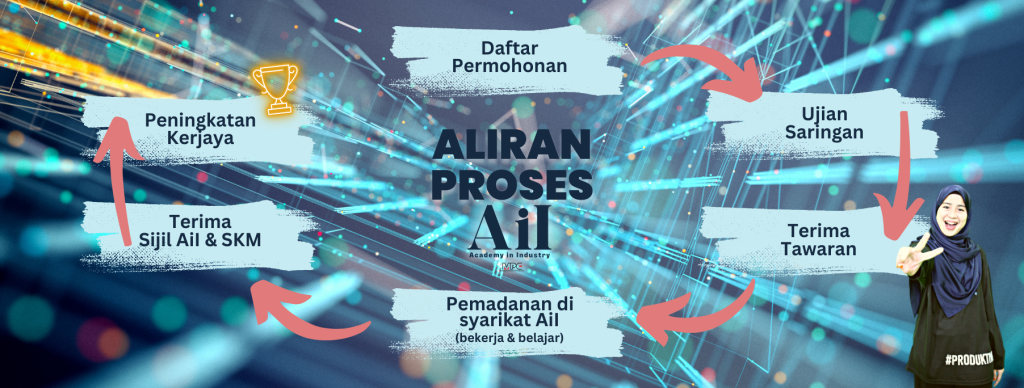
Academy in Industry - Introduction
- The Academy in Industry (AiI) Program is a work-study initiative under the supervision of the Malaysian Productivity Corporation (MPC), established through innovative collaboration between the Government, industries, and academia to address challenges in developing local talents.
- The Malaysian Productivity Corporation (MPC) is the accrediting body for registered companies participating in this program.
- AiI trainees must undergo an 18-month program to qualify for the AiI Graduate Certificate (equivalent to the Malaysian Skills Certificate (SKM) Level 3).
- The AiI program modules encompass general subjects and specific modules related to the operations of the involved companies.
- AiI trainees will receive a full minimum salary and other allowances provided by the company.
For further information, download the AiI Brochure or refer to the Official AiI Website.

Academy in Industry - Qualifications
- Malaysian Citizen
- Aged between 18 – 40 years
- Possess writing, reading, and arithmetic skills (3M)
- Pass the AiF screening test
Academy in Industry - Steps to Join
Step 1: Register as an AiI trainee candidate on the AiI Registration Website.
Step 2: Attend an interview (in person or online).
Step 3: Take the AiI screening test (reading, writing, arithmetic skills).
Step 4: Receive the acceptance status offer via email or phone call.
Step 5: Receive the AiI certificate & SKM upon completing the work period.
News on Academy in Industry (AiL)
KUALA LUMPUR, AUGUST 1 — The Malaysian government is backing the Academy in Industry (AiL) pilot project with a generous RM4,000 monthly incentive for trainees, aiming to boost the appeal of Technical and Vocational Education and Training (TVET) as an attractive alternative to traditional tertiary education.
Economy Minister Rafizi Ramli revealed that the government has allocated RM40 million to support the initial batch of the AiL programme and plans to attract up to 10,000 trainees by year-end.

The 18-month AiL programme offers trainees a total incentive of RM4,000, making it an appealing option for those seeking early earnings and technical certifications. Participants will receive RM2,000 per month during the program, along with relocation allowances, cash incentives for job retention for nine months, and a final cash bonus upon certification.
The incentive structure is strategically designed to encourage trainees to complete their training and stay committed to their jobs, ensuring financial support for their career development.
Rafizi emphasized that the programme addresses the financial burden that previously deterred many school leavers from joining the manufacturing and technical sectors, as it offers assistance with relocation expenses and financial support for house rentals and essential needs.
Rafizi emphasized that the programme addresses the financial burden that previously deterred many school leavers from joining the manufacturing and technical sectors, as it offers assistance with relocation expenses and financial support for house rentals and essential needs.
The AiL initiative aims to significantly contribute to the productivity growth target outlined in the 12th Malaysia Plan, with an expected annual growth rate of 3.6% and a 40% increase in workers’ compensation by 2025.
As part of the scheme’s goals, up to 1,000 companies will be accredited for workforce skill improvement, with a focus on reskilling and upskilling efforts.
During the launch, Rafizi announced that around 200 international manufacturing companies have already joined the programme, which aims to implement labor market reforms and provide opportunities for youths to be trained as highly skilled workers.
Highlighting the significance of obtaining technical certifications through TVET, Rafizi mentioned that graduates of the 18-month programme will be certified in their skills by the age of 19, setting them apart from peers pursuing traditional university education.
The pilot project’s success will dictate funding adjustments in subsequent years, with the potential to accommodate more participants and expand the initiative.
“We can also hope that many more workers will join, and we will adjust the funding accordingly starting next year,” Rafizi added, expressing optimism for the programme’s growth and positive impact on the workforce.